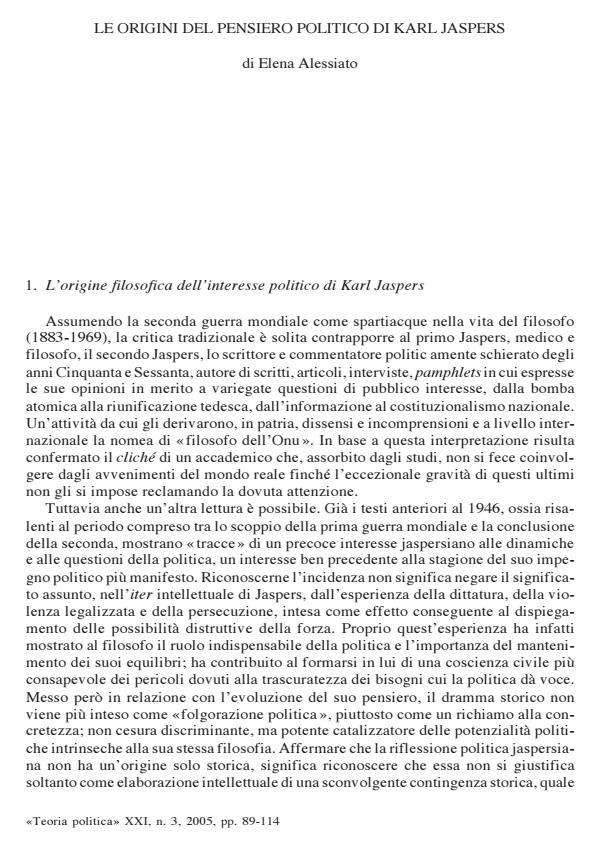Le origini del pensiero politico di Karl Jaspers
Journal title TEORIA POLITICA
Author/s Elena Alessiato
Publishing Year 2005 Issue 2005/3
Language Italian Pages 26 P. File size 516 KB
DOI
DOI is like a bar code for intellectual property: to have more infomation
click here
Below, you can see the article first page
If you want to buy this article in PDF format, you can do it, following the instructions to buy download credits

FrancoAngeli is member of Publishers International Linking Association, Inc (PILA), a not-for-profit association which run the CrossRef service enabling links to and from online scholarly content.
The traditional philosophical historiography is used to present Karl Jaspers as an «apolitical» scholar with no sense of reality until 1945. Against this image the following paper explains Jaspers’ political thought under the sign of continuity and states that Jaspers’ interest in politics has its deepest origin in the peculiar Jaspers’ idea of philosophy. From the persuasion that philosophy has to be a Lebenspraxis addressed to fulfil the requirement of freedom and dignity that the human nature sets forward, it follows that the relationship between philosophy and politics is necessary and mutual: «There is no great philosophy without political thought». Without overlooking the deep difference between Jaspers’ political meditation before 1933 and the one after 1945, the following essay shows that Jaspers’ interest in politics dates back to the time of the First World War. In 1917 Karl Jaspers gave a lecture at a meeting of a political club, of which he was member, formed in Heidelberg during the First World War: Politische Stimmungen. This is the first Jaspers’ political writing, remained nearly unknown until it was transcribed and published for the first time in 1999 in Germany. The heavy influence of Max Weber is clearly recognizable both in the use of ideal type system and in Jaspers’ approach to political world, that is possible to call as realistic. The same approach appears in the essay Die geistige Situation der Zeit (1931). But the intellectual categories of the Existenzphilosphie and in particular the ontological antinomy between Dasein and Existenz taint Jaspers’ political analysis and prevent it from being efficacious and persuasive. The realistic paradigm still remains abstract and unable to make out the concrete happenings and dangers of reality. The Second World War and the horror of National Socialist dictatorship will bring to full maturity the philosophical attitude showed by Karl Jaspers toward the human being and all the aspects of his existence, from medicine up to politics.
Elena Alessiato, Le origini del pensiero politico di Karl Jaspers in "TEORIA POLITICA" 3/2005, pp , DOI: